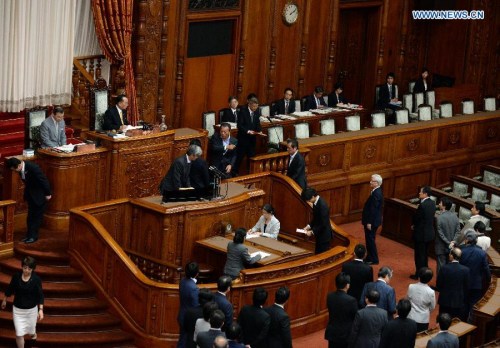
Japan's lawmakers line up to cast their ballots during a plenary session for a vote on security laws at the upper house of the parliament in Tokyo, Japan, on Sept. 19, 2015. Japan abandoned its 70-year pacifism since the end of World War II as the parliament's upper house on early Saturday enacted a controversial legislation pushed forward by the government under Prime Minister Shinzo Abe. (Xinhua/Ma Ping)
Japan's new security bills not only broke Japan's promise to the world after World War II, but also betrayed its own people, formerly protected by a pacifist constitution.
Japan abandoned 70 years of peaceful defense with the controversial legislation pushed forward by the government of Prime Minister Shinzo Abe, which allows Japan to deploy troops to foreign battlefields so long as its allies are under attack or Japan claims to feel threatened.
The international community and neighboring countries are very worried by Japan's shift to the right, and ordinary Japanese people are petrified that the country might be led astray again just as militarists did 84 years ago.
Japanese troops instigated the "Mukden" incident on Sept. 18, 1931 when they blew up China's railway near Shenyang in northeast China and accused Chinese army of sabotage as a pretext for attack. The incident began the full-scale invasion of China that lasted for 14 years.
The war inflicted 35 million casualties on the Chinese people, while Japan endured a death toll of 3 million with its territory bombarded into the ground.
In the past few weeks, many demonstrators, the maximum number of which exceeded one million in a single day, have taken to the streets to oppose the bills.
A national poll released earlier this week showed that 68 percent of the respondents opposed to the bills, compared with 29 percent who showed their support. Moreover, more than 90 percent of Japan's constitutional experts believe the legislation violates the Japanese supreme law. The Japanese governing administration and congress have lost their legitimacy of rule and their decision-making should be regarded invalid.
Muscling through the bills may be a fait accompli, yet public discontent will backfire on Japan as a nation and cause even greater rift among the people, triggering further economic stagnation or even a depression.
The majority of Japanese are peace-loving and will not stand idly by nor send their loved ones to fight wars on foreign soil for another nation's interests, and bear the moral hazard and possible legal punishment if things went sour.
They simply cannot stand to witness another fanatical war plunging their homeland into a chaotic abyss of suffering only 70 years after the last.
The majority of Japanese are clearly aware of what they are truly willing to fight for -- a prosperous life with the prospect of sustainable growth and a peaceful external environment, so that Japan, with its resource-poor setting, can continue to work with its neighbors and participate in the international division of labor.
Today's Japanese people enjoy a decent life thanks to their resilience and hard work, but they should never forget Japan's swift rise as a technology and economic power was largely due to the fact that it had abandoned the militarist mentality and embraced peace with less military costs.
Japan's focus on economic growth and democratic reform led to its accomplishments, and the Japanese people know they should uphold peace, development and cooperation.
The Abe administration's arbitrary behavior in forcing through the bills has undermined Japan's democratic ideals. It was reprehensible and unpopular, and will face strong opposition from both the international community and the Japanese people.


















































